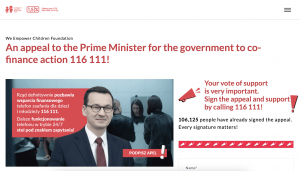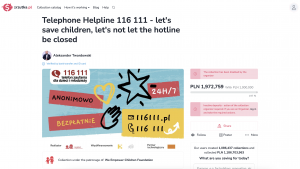
Dr. Christian Gahrmann: Once upon a time – what we can learn from fairy tales for our storytelling
May 22, 2024
Major donor study by Austria’s FVA reveals both sobering & encouraging facts
July 10, 2024When the Polish government cut funding for Empowering Children Foundation’s Helpline for Children, the Foundation had to act fast to try to remedy the situation. Fundraising expert Magda Sadłowska shares how the Foundation’s crisis response campaign not only saved the helpline but brought in new supporters.
In Poland, the Empowering Children Foundation has operated Helpline for Children and Youth in Poland for 15 years, with specialists answering over 50,000 calls a year from children in need of help. Providing this professional assistance however requires several million Polish zlotys annually (with 1 million zlotys equal to around 235,000 euros).
Bold decisions in difficult times
During the initial years of operation, around 50-60% of the helpline’s budget was financed by the Polish government. Later, this support decreased to just 5%, and then in January 2022, the PiS government unexpectedly decided to withdraw its support altogether, creating a crisis situation for the helpline staff. In response, the organization decided to appeal to the Prime Minister through a petition published on its webpage, requesting an explanation for the withdrawal of its support. It was a risky decision, with such a public confrontation running the risk of all government funding being suspended. Nevertheless, the critical situation forced the organization to take action, and it published the appeal the day after the news broke.

The petition
Widespread response thanks to Instagrammers
Widely covered in mainstream media – radio and television – the petition gained significant interest. But it was after popular influencers became involved, including bloggers from Make Life Harder, a profile followed by 1.5 million people on Instagram, that things really took off. After they published a post, a massive movement began, and a wave of signatures followed, topping 100,000 within a few days. A fundraising campaign was also launched on one of the crowdfunding platforms, zrzutka.pl, by an entrepreneur associated with Make Life Harder. People immediately started donating. The organizer himself said that the result exceeded his wildest expectations: “I sat and refreshed the page time after time, watching the amount grow each time. It was incredibly beautiful!”

The crowdfunder
Ultimately, the equivalent of over 470,000 euros were raised, with more than 40,000 people donating to support the helpline. This alone was a great success, but it wasn’t the end.
Telemarketing as a continuation of the campaign
Out of the 100,000 people who signed the petition, over 40,000 left their contact information in the form of a phone number – an optional feature in the petition signing form. Within a few days, the Foundation launched a massive telemarketing campaign. A call centre, experienced in fundraising campaigns and already working with the Foundation, undertook its execution, making it possible to start the campaign quickly.
The telemarketing team consisted of 8 people, all trained in knowledge about the helpline, the Foundation’s operations, and with the latest statement from the board regarding the appeal to the Prime Minister. They contacted people who had signed the petition, asking them to consider providing regular monthly support to the Foundation by setting up a direct debit for a fixed amount. Almost 2,000 people (5% of the entire database) agreed to this form of support.
Donors were asked to contribute a minimum of 8 euros per month, ultimately generating income of around 16,000 euros for the organization, or over 190,000 euros annually. Together with the funds raised from the campaign, this amounted to 660,000 euros. It was enough to enable the helpline to safely continue its operations. Additionally, the communication cycle about the Foundation’s actions resulted in further donations to other Foundation appeals. Some of those contacted also participated in a campaign asking people to allocate 1.5% of their taxes to the organization – one of the options available in Poland and the Czech Republic as part of annual tax settlement arrangements.
Factors for success
Building the organization’s image and social capital
As well as providing financial resources, the petition contributed to building a large base of people supporting the Foundation, increasing its recognition among various recipient groups it had not reached before, and establishing itself as an expert authority in helping children at risk of violence. All of this was possible thanks to the organization’s experience gained through previous actions on a much smaller scale. The situation necessitated an immediate response, and in these circumstances, it would have been impossible to build the mechanisms for petition signing or find subcontractors for telemarketing campaigns without prior experience.
Professional database
A significant role was played by a professional CRM solution (Salesforce) integrated with the petition signing form, and the call centre had a developed process for sharing and updating data. The fundraising team had real-time access to current reports and campaign progress. The system was also configured to automatically register anyone who signed the petition and send them an email thanking them and proposing regular support.
Involvement of the PR team
The preparedness of the communication team was also crucial; they swiftly prepared a crisis statement, maintained ongoing contact with the media, and handled all enquiries. Those prepared for media appearances were the chairperson of the board and the coordinator of the helpline. If communication had not been handled so efficiently, the organization might have faced not only a financial crisis but also a reputational one.
5 key principles of crisis response campaigns
- A previously tried and tested call to action, for example: sign a petition, make a donation or send an SMS, with a direct and easy to understand message. During such campaigns, everything happens so quickly that there is no time for learning on the go or for a comprehensive response to errors.
- A prepared statement on the organization’s official position and fully briefed employees whose role it is to speak to the media – all media contacts should be directed to these individuals. One unprofessional or unguarded statement can have a very negative and lasting impact on your organization’s image.
- A readiness to capitalise on the response, from supporters and donors, as well as influential individuals with large audiences. In times of frustration, people want to feel that they can do something. This is energy and motivation that must be utilized.
- An awareness that crisis response mobilizes the entire team, and may require more commitment than the anticipated work time. It is important for employees and volunteers to feel appreciated and have clear information about both expected involvement (“Be prepared for media/donor contacts, even on weekends”) and compensation for overtime.
- Ability to leverage the image potential and social engagement built during the crisis. Follow-ups, updates on the current situation, or information about campaign progress are invaluable and can generate greater revenue than the campaign itself. For Empowering Children Foundation, the readiness of the team, both in terms of tools and operations, enabled the swift and effective implementation of the campaign, ultimately saving the helpline.
Being prepared to respond to a crisis is a significant challenge and a test of an organization’s and team’s performance – but it can yield spectacular results.

Magda Sadłowska
About Magda Sadłowska
Magda Sadłowska is a fundraiser and manager with 20 years of experience. As a board member, she was responsible for building financial security as well as PR and communication at the Empowering Children Foundation; previously, she managed the fundraising team at Amnesty International. She trains and supports NGOs in creating communication and fundraising strategies and plans. Together with Enxoo sp. zoo, she creates dedicated NGO solutions for digitalization and automation of activities.
Main picture by Cheryl Holt on Pixabay



